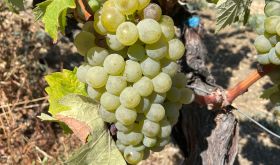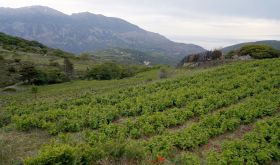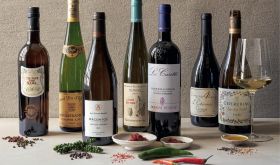The fact that Greece produces some fine wine is now known by many serious wine lovers around the globe and believed fervently by all Greeks, even if they are in practice much more enthusiastic consumers of cigarettes and mobile phones (12 million units reportedly owned by a total population, including children and those too old to text, of 11 million). Beer, ouzo and other spirits are often more commonly drunk in Greece than wine, except in the smarter restaurants. Perhaps it is because most Greeks encounter good quality wine mainly on restaurant wine lists with their customary high mark-ups that the pricing of Greek wine seems relatively ambitious in an international context.
Good Greek wine will never be cheap however because most producers are small-scale. Vineyards, the great majority of which are still in the hands of farmers rather than wine producers, yield only half as much wine per acre on average as those in France and Italy, thanks to the low rainfall and rarity of irrigation. Most of these vineyards are small, uneconomic, hand-tended plots, often on hillsides, many at unusually high altitudes. And the overall cost of land and materials in Greece is relatively high.
Greece will never be a serious player in the high-volume, low-price wine game but she has much of interest to offer the wine lover prepared to spend between £5 and £15 a bottle. Some winemakers ask even more than this for a bottle of their wine but I have yet to taste anything from a current vintage that warrants such a price.
Of course Greece was an important wine producer in classical times (Tony Blair might like to study Dionysus and the Maenads for some inspiration on how to tackle binge drinking) but the modern Greek wine market is still in its infancy. This means that within Greece the international grape varieties, Cabernet Sauvignon, Sauvignon Blanc, Chardonnay and increasingly Syrah and Viognier, still have the allure of novelty for Greek wine drinkers and can command high prices.
Costa Lazaridi, one of two brothers who have established neighbouring rival wineries near Drama (this is Greece, remember), has had enormous success with his Sauvignon Blanc bottled under the certainly dramatic Amethystos label, for example. Domaine Porto Carras, also in the far north east of the country and the first of modern Greece's internationally recognised wine producers, staked its claim to fame on copies of red bordeaux. The current Chateau (sic) Porto Carras 2001 is a well-crafted bordeaux blend, offered at £16-18 in the UK but, despite the inclusion of a little local Limnio nowadays, could really have been made anywhere. Carras's Syrah 1999 is also well made but seems distinctly overpriced at £35 a bottle, especially in comparison with Gerovassiliou's Syrah.
One of the most revered and expensive white wines within Greece is a Chardonnay from Katsaros, a small organic outfit on the slopes of Mount Olympus, another wine with little obvious national identity other than the Greek alphabet on the label. Of the 2003 Greek Chardonnays I tasted recently I marginally preferred Hatzimichalis to the slightly astringent Katsoros – and among 2002 Chardonnays preferred that from the new Biblia Chora operation spawned by backing from producer Gerovassiliou for the winemaker who used to be responsible for Amethystos.
For us foreign wine drinkers it is Greece's hundreds of native vine varieties that represent Greek wine's real current attraction and future potential. The most obviously noble and distinguished Greek grape variety for the moment is Assyrtiko, the super-refreshing lemon-and-minerals grape of the volcanic island of Santorini, now increasingly planted elsewhere in Greece. It has such a powerful character that it blends well with both Chardonnay and, as evidenced in Biblia Chora's 2003 blend, Sauvignon Blanc.
Evharis, an estate complete with hillside vineyard west of Athens, has done particularly well with both pure Assyrtiko and Assyrtiko-Chardonnay blends.The 2000 Assyrtiko from Papaïoannou, another enterprise near Corinth, was given four months in oak and with time has taken on a most appealing nuttiness.
On the basis of tasting young Assyrtiko from Santorini both oaked and not I had always assumed that, like the equally crisp and aromatic Riesling, this was a grape unsuited to barrel ageing. However, a complete tasting of both versions from the excellent producer Sigalas in the last three vintages convinced me that the 2001 barrique version of Sigalas Santorini is indeed delicious after two or three years in bottle.
On balance Greece seems to me to be making rather more exciting whites than reds so far (but then far more white grapes are planted than reds – a retsina hangover?) with indigenous grape varieties such as the lime-scented Malagousia, grapey (but sometimes bitter) Moscofilero and the rare but promising Lagorthi.
Many of the reds among the 150-plus Greek wines I have tasted recently in London and Athens seemed curiously rustic and old-fashioned, even though some of them are quite expensive and highly regarded within Greece. Alcohol levels are generally between 12 and 13 per cent and even I, an alcoholphobe, cannot help wondering whether later picking would result in more flavour.
Notable exceptions to this include the wines of the highly promising Alpha Estate or Ktima Alfa (Ktima is Greek for estate or domaine) in the obscure Amynteon appellation in the far north whose vines are still quite young; Mercouri's Antaris 1999, a blend of Cycladean (now Ionian) Avgoustiatis grapes with French Mourvèdre which does taste a bit southern Rhône-like but has real meat in the middle; Château Nico Lazaridi 2001, a blend of Bordeaux grapes with 20 per cent ancient Limnio; Sigalas' experimental bottling of the Santorini grape Mavrotragano; Gaia Estate's model, though expensive, Nemea made from Agiorgitiko grapes; and Tselepos's reds are certainly competent in an international style.
The emergence of the first Greek Master of Wine, Constantinos Lazarakis, in 2002 can only be good for the country's wine industry. For the moment his chief complaint is that it is too, if you will forgive the rather obvious word, insular. Too few Greek wine producers are aware, he feels, of what is going on in the rest of the tight-knit wine world (and none surely reads the Australia and New Zealand Wine Industry Journal for pleasure as he does). 'For instance, Greece has the highest incidence of Viognier per producer outside France. There is also lots of Syrah. But no-one in Greece is experimenting with today's fashionable co-fermentation of Syrah with Viognier' is one of the MW's observations.
Lazarakis was invited by Skouras, an enterprising producer that has taken the novel step of labelling wines primarily by grape variety, to make a wine with them. The resultant Chardonnay was released five months ago at a record 17 euros a bottle and sold out in two weeks. It is Greece's only screwcapped wine.
Another complaint of the very few wine writers who specialise in Greece – Lazarakis, Geneva-based Nico Manessis who has been spreading the gospel of fine Greek wine around the world with near-incredible persistence for years now and Miles Lambert-Gocs who is based in Washington DC – is the lack of any generic promotion behind Greek wine. But then the Greek wine producers themselves are predictably riven by feuds and factions.
It is a wonder perhaps that Greek wine has managed to establish any sort of reputation abroad. This has been mainly the work of a handful of enthusiastic importers. In Britain the Oddbins chain has long championed the cause though has recently trimmed its list. Other UK specialist importers include Eclectic Wines of London SW6 3RA (mary@eclecticwines.com), The Real Greek restaurant of London N1, Vickbar of London NW5 (gjdlemos@btinternet.com but from later in July wine@vickbar.com) and Yodeska of Northampton (greekcellars@yodeska.co.uk). In the US prominent importers of Greek wine include Paterno, Nestor and Diamond Importers.
But perhaps most dramatic of all, supposedly ultra-conservative British retailer Marks & Spencer recently introduced three Greek wines. The two blends of Greek and international grapes at £9.99 are first rate. Red Evangelo 2003 from Gerovassiliou and especially the white Zefiros Assyrtiko-Sauvignon Blanc 2003 from Biblia Chora (tasting remarkably like the Sauvignon Blanc-Assyrtiko under their own label) are well worth a try.
Some Greek bargains
Xerolithia Peza 2003 Crete £5.49 Oddbins
Cretan white from the local Vilana grape
Sigalas 2003 Santorini £8.20 plus delivery from importer Vickbar
Classic Assyrtiko from Santorini – for Riesling lovers
Boutari 2001 Nemea £3.99 Aldi
By far the most characterful of a range of four Greek wines shipped in by this supermarket to sell at £3.99 during the Olympics. This has some guts and tannin and is a bargain introduction to the Agiorgitiko (St George) grape of Nemea.
Tsantali Rapsani 1997 Rapsani £6.69 Laithwaites
Mellow red blend of Greek grapes from the biggest company, currently trying hard
Tsantali Organic Cabernet Sauvignon 2001 Halkidiki £6.49 Waitrose
Pretty good price for a year in new oak if not the most Greek wine here













